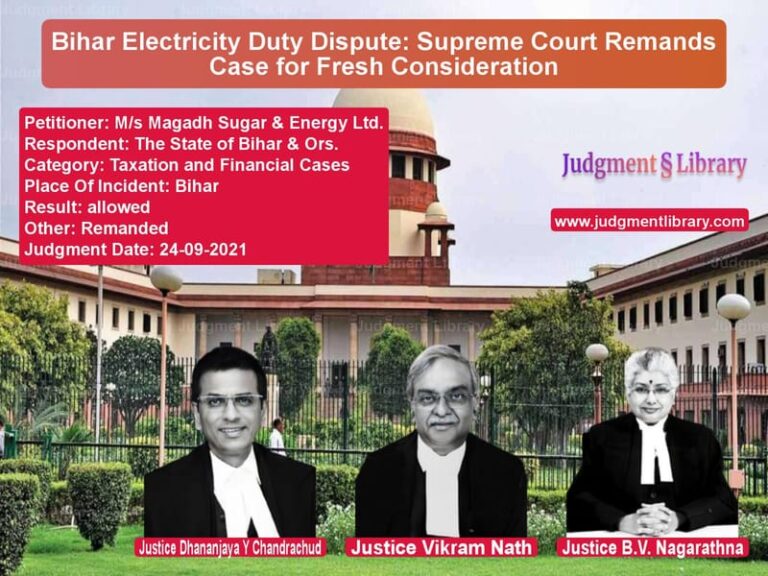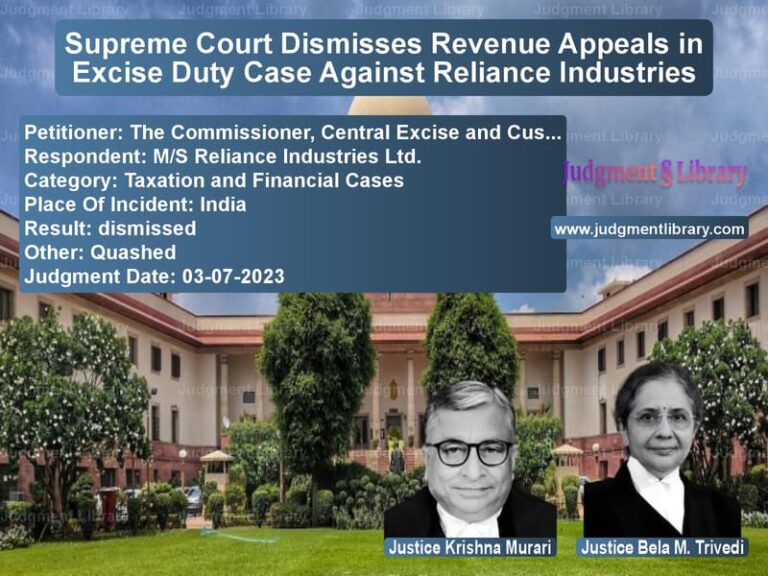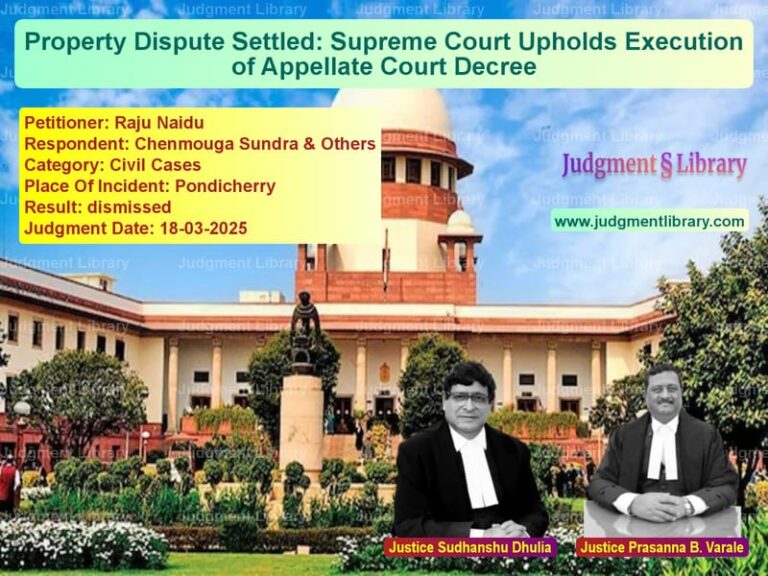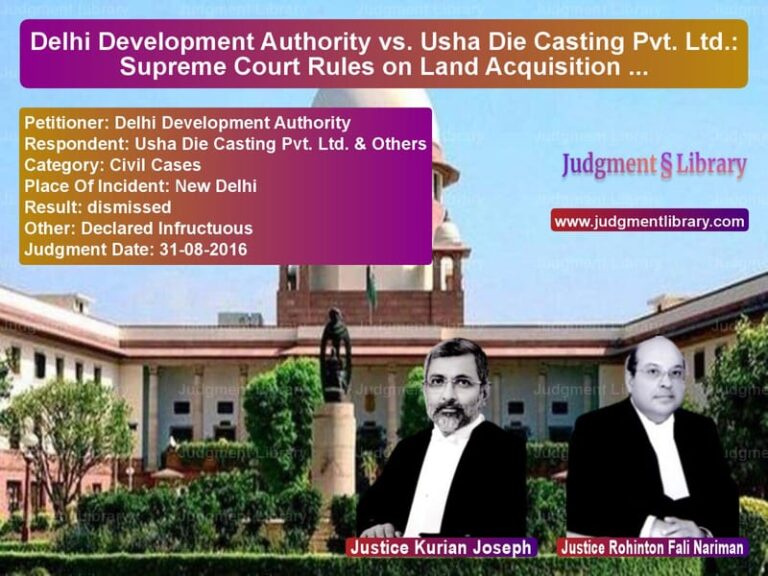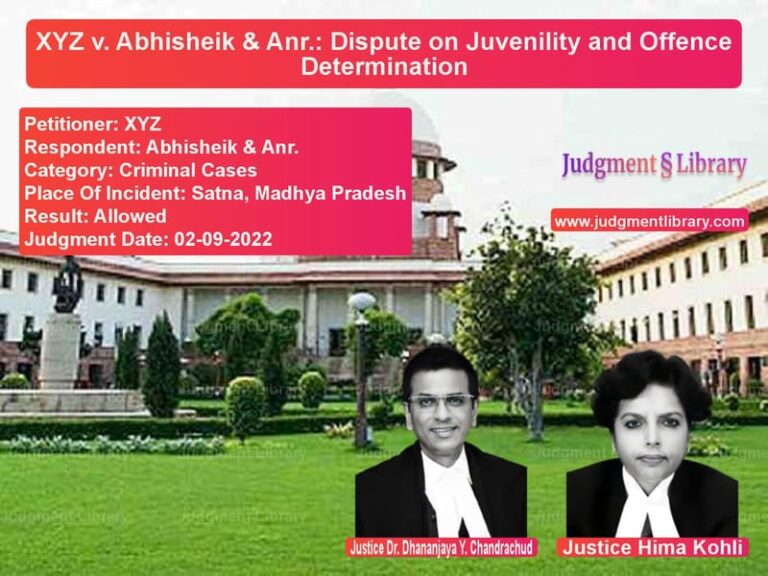Delayed Bond Payment Dispute: Supreme Court Upholds SIDBI’s Stand Against SIBCO
The Supreme Court of India recently adjudicated a dispute between the Small Industries Development Bank of India (SIDBI) and SIBCO Investment Pvt. Ltd. regarding interest claims on delayed bond payments. The case, Small Industries Development Bank of India vs. SIBCO Investment Pvt. Ltd., revolved around whether SIDBI was liable to pay additional interest to SIBCO due to the delay caused by regulatory restrictions imposed by the Reserve Bank of India (RBI).
Background of the Case
The dispute originated when SIBCO purchased 41 bonds from a third party that had originally been issued by SIDBI to M/s CRB Capital Markets Ltd. in 1993. The bonds were later transferred to various entities, ultimately reaching SIBCO on July 1, 1998. However, CRB Capital faced insolvency proceedings initiated by the RBI, leading to restrictions on bond transfers. SIBCO, upon presenting the bonds for registration and interest collection, was denied immediate recognition as the legal holder by SIDBI due to the RBI’s embargo.
After a prolonged legal battle, the company court ruled in December 2004 that SIBCO was a legitimate bondholder. Subsequently, SIDBI released the principal and interest amount to SIBCO in February 2005. However, SIBCO later demanded additional interest for the period of delay, leading to the present litigation.
Trial Court’s Findings
The trial court ruled in favor of SIDBI, holding that:
- SIDBI acted in compliance with RBI’s directives, which prevented premature recognition of SIBCO as the rightful bondholder.
- The company court had jurisdiction over the liquidation proceedings, which further delayed bond payments.
- SIBCO had accepted the payment in 2005 without protest and raised claims for additional interest only after eight months.
Calcutta High Court’s Verdict
The Division Bench of the Calcutta High Court reversed the trial court’s decision and ruled in favor of SIBCO. It held that:
- SIDBI continued paying interest on the bonds even after RBI’s advisory in June 1997, implying that the advisory was not binding.
- SIDBI’s withholding of payments without specific court orders was unwarranted.
- SIBCO was entitled to additional interest for the delayed period.
Supreme Court’s Observations
The Supreme Court, comprising Justice R. Subhash Reddy and Justice Hrishikesh Roy, scrutinized the legality of the RBI’s restrictions and SIDBI’s compliance. The Court observed:
“The RBI has wide supervisory powers over financial institutions like SIDBI, and any directive issued in furtherance of public interest carries statutory backing.”
The Court ruled that:
- The RBI’s directive dated June 9, 1997, was binding under the RBI Act, 1934, and the Banking Regulation Act, 1949.
- SIDBI acted lawfully in withholding payments until the company court’s verdict.
- SIBCO’s claim for additional interest was invalid as it had already accepted the payment without protest.
- The delayed transaction fell within the “suspect spell” under Section 531 of the Companies Act, justifying SIDBI’s caution.
Final Judgment
The Supreme Court overturned the High Court’s ruling and upheld the trial court’s decision. It stated:
“SIDBI was justified in withholding bond payments due to regulatory restrictions, and SIBCO’s claim for additional interest is akin to Shylock’s demand for a pound of flesh.”
The Court also rejected SIBCO’s demand for pendente lite interest, stating that the claim was an afterthought.
Legal Implications
This ruling sets crucial precedents:
- Regulatory restrictions imposed by RBI on financial institutions must be adhered to.
- Delayed payments due to legal or regulatory complications do not automatically entitle the claimant to additional interest.
- Claimants must protest at the time of payment acceptance to preserve subsequent claims.
Conclusion
The Supreme Court’s ruling strengthens the legal framework around financial regulations and ensures compliance with RBI directives. The judgment affirms that financial institutions acting under regulatory embargoes cannot be penalized for delayed payments, provided they act in good faith.
Petitioner Name: Small Industries Development Bank of India (SIDBI).Respondent Name: SIBCO Investment Pvt. Ltd..Judgment By: Justice R. Subhash Reddy, Justice Hrishikesh Roy.Place Of Incident: Kolkata, West Bengal.Judgment Date: 03-01-2022.
Don’t miss out on the full details! Download the complete judgment in PDF format below and gain valuable insights instantly!
Download Judgment: small-industries-dev-vs-sibco-investment-pvt-supreme-court-of-india-judgment-dated-03-01-2022.pdf
Directly Download Judgment: Directly download this Judgment
See all petitions in Banking Regulations
See all petitions in Tax Refund Disputes
See all petitions in Customs and Excise
See all petitions in Judgment by R. Subhash Reddy
See all petitions in Judgment by Hrishikesh Roy
See all petitions in allowed
See all petitions in Modified
See all petitions in supreme court of India judgments January 2022
See all petitions in 2022 judgments
See all posts in Taxation and Financial Cases Category
See all allowed petitions in Taxation and Financial Cases Category
See all Dismissed petitions in Taxation and Financial Cases Category
See all partially allowed petitions in Taxation and Financial Cases Category



